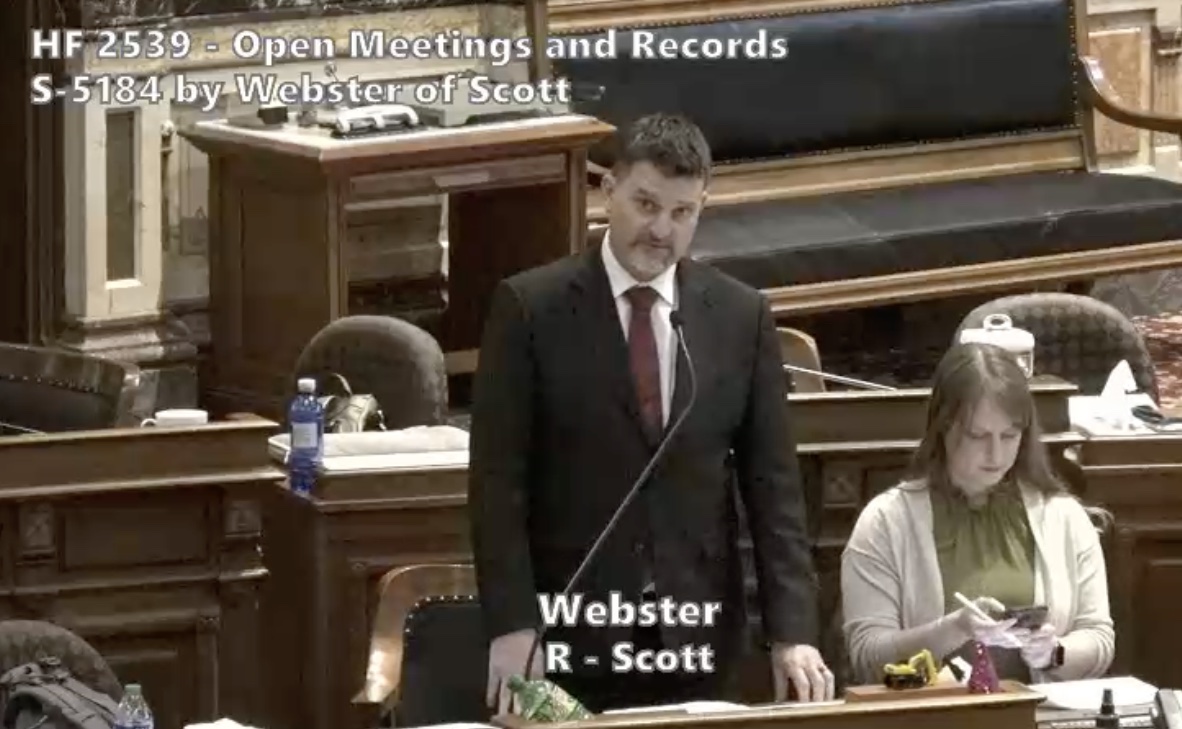Iowa
Iowa school voucher overflow raises concerns some students may be left behind
/cloudfront-us-east-1.images.arcpublishing.com/gray/5XOY3RU5VJBEPNBMUTVZLVND6Y.PNG)
DES MOINES, Iowa – When Iowa’s “Students First Education Savings Account” program was introduced, critics sounded the alarm that certain students may be denied entry into certain private schools. Two Iowa private schools say that’s not the case. .
The state received nearly 30,000 applications for those vouchers. Jennifer Raes principal at St. Anthony Catholic School in Des Moines says since the voucher bill passed, enrollment has increased by about ten percent. Raes says many parents tell her they always wanted to check out a private school, but the cost was a hindrance.
“Parents just want to find the right fit for them, you know with anything, whether it’s your hairdresser, if it’s not going well, go try out another one. You know, you want to find the right fit for yourself and parents didn’t want to have that choice for schools, and when you’re limited to a school that’s based on just where your home is positioned. That’s difficult, you don’t have a choice.,” Raes said.
Though St. Anthony is a religiously affiliated school, Raes says her school would accept an LGBT student, but notes students will be taught according to the Catholic faith.
Josh Bowar, head of Sioux Center Christian School says they usually get around five to ten new students, but this year they’re getting 30. Bowar says they try to accommodate students with special needs.
Another barrier critics say could impact a student’s ability to attend a private school – cost. Raes says the state of Iowa has programs to help lower-income families afford tuition.
Copyright 2023 KCRG. All rights reserved.

Iowa
Judge holds Iowa Department of Corrections in contempt for violating order • Iowa Capital Dispatch

Remarking that it’s not feasible to jail the Iowa Department of Corrections for deliberately violating a court order, a Polk County judge has fined the agency $1,500 for contempt of court.
The penalty stems from a lawsuit that 13 prison inmates, then housed at Anamosa State Penitentiary, filed against the Iowa Department of Corrections in 2018. The inmates alleged the DOC was violating their constitutional rights by denying them access to magazines or other materials with nudity or sexually explicit content.
The lawsuit was triggered by the Iowa Legislature’s 2018 revision of the state law that restricts inmate access to adult content. After the 2018 revisions, the law barred any commercially published material that contained not only sexually explicit content, but also nudity.
A judge in the case concluded the law and the DOC policies that sprang from it were potentially too broad and could infringe on the inmates’ First Amendment rights. The court issued an injunction that stated the DOC “shall not prevent the distribution of materials to (the plaintiffs) and other inmates similarly situated that features mere non-sexually explicit nudity.”
In 2022, with the injunction still in place, one of the plaintiffs sought to hold the DOC in contempt of court, alleging the department was violating the 2019 order by denying his request to purchase lingerie magazines. The inmate later testified that he had filed a complaint with the Iowa Office of Ombudsman on the issue. Court exhibits show that in October 2020, the ombudsman’s office told the inmate it questioned the DOC’s “dubious interpretation and application of the court injunction” — indicating the DOC had been put on notice that it was violating the court order.
At around that same time, another plaintiff complained the DOC had taken away his copy of Sports Illustrated’s swimsuit issue – a magazine that’s commonly available at grocery stores and other mass-market retailers.
During the trial, Dee Radeke, an inmate and prison librarian, testified that after the Legislature amended the law in 2018, a prison security director asked him to pull from circulation any pictures of pin-up girls, graphic novels or novels containing strong sexual content such as “Shades of Grey.”
DOC Executive Officer Rebecca Bowker testified that she followed the court’s order “to a T,” but also testified that she wasn’t sure whether she had even seen the order. In addition, Bowker testified that she believed DOC policy prohibited photos of women in thong bikinis on the grounds that woman’s genitalia would not be “substantially” covered.
The inmates lost their case, with Polk County District Court Judge Jeffrey Farrell concluding they did not have a First Amendment right to possess materials containing nudity. Farrell then turned to the issue of whether the DOC had violated the 2019 injunction while the case was still pending.
The DOC, Farrell concluded, had “violated this order in multiple ways,” in part by amending its own policies in 2022 – long after the inmates had sued and the injunction was issued – in a way that more explicitly barred any materials that included nudity.
“The injunction had been in place for three years at the time DOC changed its policy in 2022,” Farrell noted. “This action shows DOC acted willfully in denying nude content despite the injunction. The DOC denied (one plaintiff’s) request for three editions of Playboy that had been approved under the prior policy.”
Because there were three separate magazines the inmate was denied, Farrell found there were three separate instances of contempt. In determining what sanctions to impose against the DOC, the judge observed it “does not consider jail as a real option, even though there is no excuse for DOC’s failure to comply with the order. DOC as an entity understood the injunction. Still, it amended its policy to ban materials containing nudity and Executive Officer Bowker personally denied some materials containing nudity.”
Adding there was no single individual who could or should be jailed as a result of the “institutional” violations of the court’s order, Farrell imposed the maximum $500 penalty for each of the three violations.
Farrell wrote that he considered awarding the $1,500 to the inmate who pursued the contempt action “so he could receive some remuneration for the unlawful denial of the publications he requested.” The law, however, stipulates the fines are punitive in nature, Farrell noted, and are intended for “the benefit of the state” – the same entity that will be paying the fine.
The Department of Corrections did not immediately respond to requests for comment. Last week, the inmates filed a motion for a new trial as well as an appeal of Farrell’s decision.
Editor’s note: Reporter Clark Kauffman worked for the Iowa Office of Ombudsman from October 2018 through November 2019.
Iowa
Iowa Farmers Were Able to Get in the Fields More Last Week – Storm Lake Radio

Scattered showers last week resulted in Iowa farmers having 3.8 days suitable for fieldwork, with 3.7 days available in northwest Iowa.
According to the USDA Crop Progress Report, Iowa farmers continued planting corn and soybeans last week, and were also cutting hay. Some replanting has occurred due to drowned-out areas in fields.
78 percent of Iowa’s expected corn crop has been planted, which is eight days behind last year and four days behind the five-year average. 82 percent of northwest Iowa corn has been planted. 47 percent of corn statewide has emerged, which is two days behind last year, but equal to normal.
61 percent of the expected soybean crop has been planted across the state, which is one week behind last year and two days behind normal. 59 percent of northwest Iowa soybeans have been planted. Nearly a quarter of soybeans statewide have emerged, which is three days behind last year, but equal to the average.
Just two percent of northwest Iowa topsoil is short of moisture, with 65 percent adequate, and 33 percent surplus. Only five percent of northwest Iowa subsoil is short of moisture, with 72 percent adequate, and 23 percent surplus.
Iowa
One vetoed bill exposed four big flaws in Iowa legislature's work

Transparency advocates found something to celebrate in Governor Kim Reynolds’ final bill signings on May 17. The governor rejected House File 2539—her only veto of the Iowa legislature’s 2024 session—due to language that would have created an “enormous loophole” in the open meetings law, experts inside and outside state government warned.
Drafting a better bill to strengthen penalties for open meetings violations should be easy, if Iowa lawmakers return to the topic in 2025.
But fixing the process that allowed such a poorly-worded bill to reach the governor’s desk would be a tall order. Because while House File 2539 suffered a unique fate, its journey through the legislature illustrated broader problems with how the GOP-controlled House and Senate do business.
-

 News1 week ago
News1 week agoSkeletal remains found almost 40 years ago identified as woman who disappeared in 1968
-

 World1 week ago
World1 week agoIndia Lok Sabha election 2024 Phase 4: Who votes and what’s at stake?
-

 World1 week ago
World1 week agoUkraine’s military chief admits ‘difficult situation’ in Kharkiv region
-

 Movie Reviews1 week ago
Movie Reviews1 week agoAavesham Movie Review
-

 World1 week ago
World1 week agoCatalans vote in crucial regional election for the separatist movement
-

 News1 week ago
News1 week agoTrump, Reciting Songs And Praising Cannibals, Draws Yawns And Raises Eyebrows
-

 Movie Reviews1 week ago
Movie Reviews1 week agoUnfrosted Movie Review: A sweet origins film which borders on the saccharine
-

 Politics1 week ago
Politics1 week agoNorth Dakota gov, former presidential candidate Doug Burgum front and center at Trump New Jersey rally



















